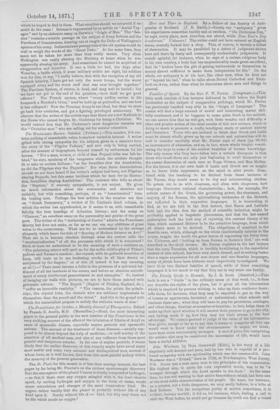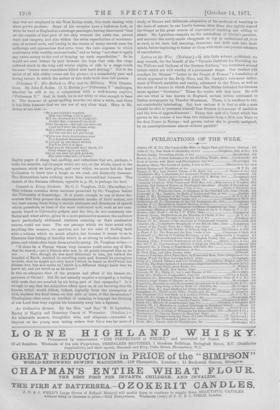John IVoolman, by Dora Greenwell (Kitts), is the story of
a life singularly self-devoted and pure, told by one who is capable of a pro- found sympathy with the spirituality which was the essence of it. John Woolwan was a "Friend," born in 1720, at Northampton, West Jersey, U.S. Never was a man more true to the principles of his communion. His highest aim, to quote his own expressive words, was to be "a trumpet through which the Lord speaks to his flock." At the same time, ho was not wanting in that active benevolence which has been one of the most noble characteristics of his people. He went, for instance, on a mission, not a little dangerous, we may easily believe, to a tribe of Red Indians. Yet his scrupulous purity of motive sometimes, it is evident, became morbid ; it did so, for instance, when, feeling a call to visit the West Indies, ho could not go because he could not find a vessel
that was not employed in tho West Indian trade, this trade dealing with slave-grown product). Some of his scruples have a ludicrous look, as when he went to England as a steerage passenger, having discovered "that on the outside of that part of the ship wherein the cabin was, carved work and imagery, and also within the cabin superfluities of workman- ship of several sorts, and having in the course of many travels seen the sufferings and oppressions that arise from the vain expense to which conformity with worldly customs leads," and so being " not clear to apply any extra money to the cost of keeping up such superfluities." So he would not send letters by post because the boys that rode the stage suffered much in the long cold winter nights, or ride in a stage-coach because "horses were sometimes killed with hard driving." Yet in the midst of all this oddity comes out the picture of a remarkably pure and loving nature, to which the author of this little book does full justice.



































 Previous page
Previous page